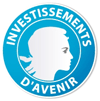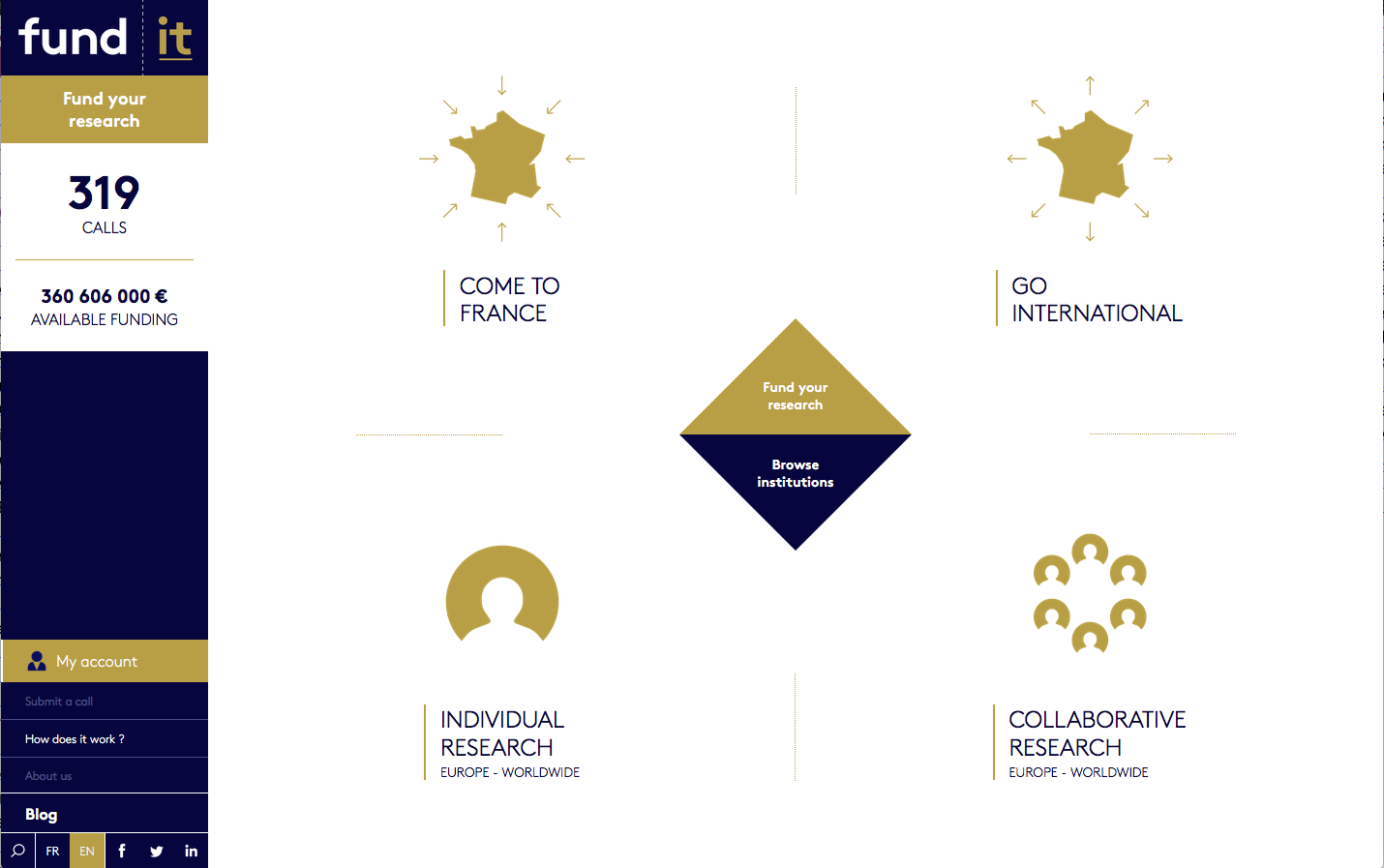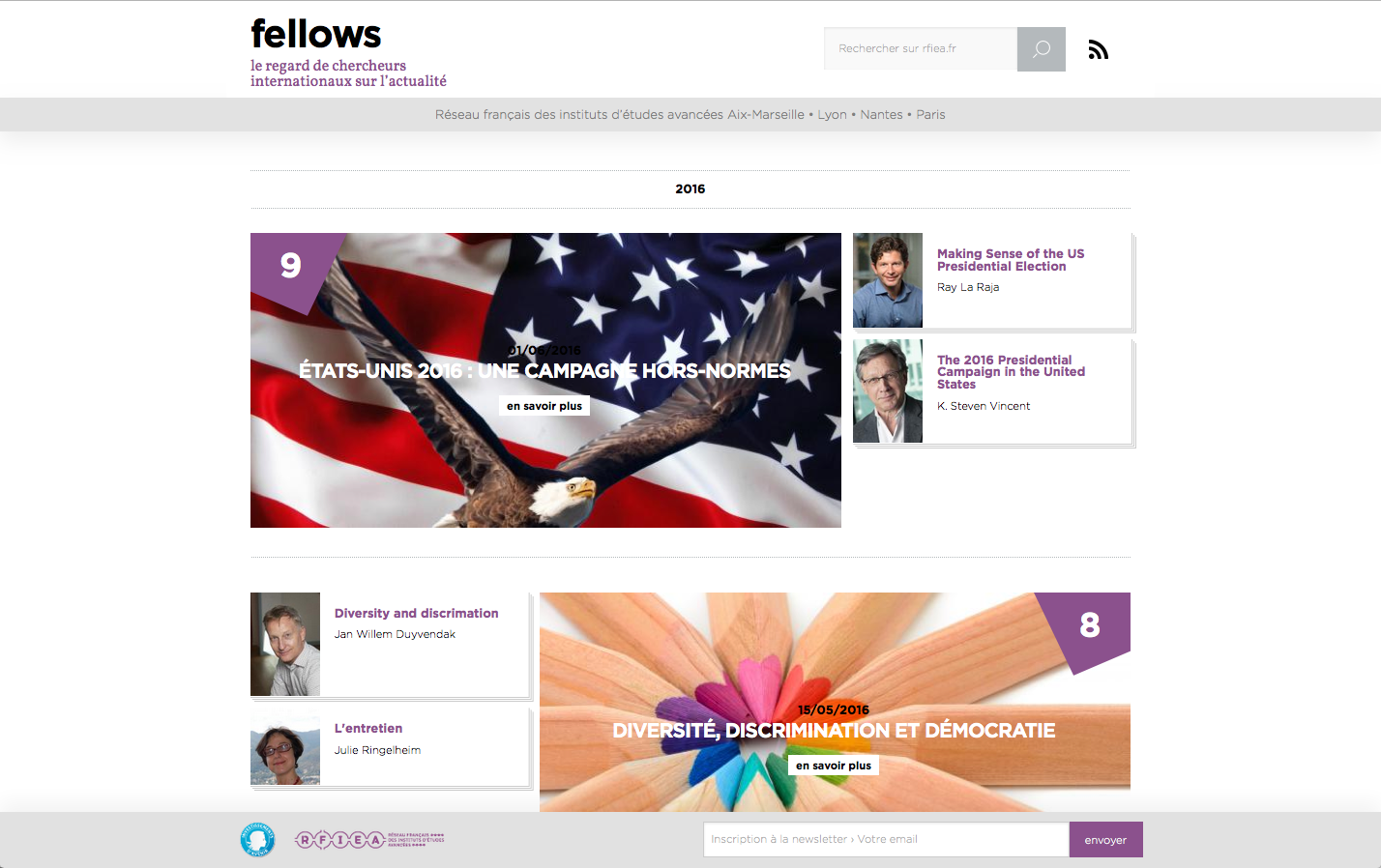French Network of Institutes for Advanced Study — Structural Activities

Address
Siège : 15 parvis René-Descartes, 69007 Lyon
Bureaux : 190 avenue de France, 75013 Paris
Phone
The foundation undertakes key projects (Labex RFIEA+, EURIAS programme, FUNDIT webplatform) to serve the institutes for advanced study and, more broadly, the internationalisation of French SSH:
• NEFIAS Infrastructure and FUND IT Platform
• Preparation for European Projects
THE LABORATORY OF EXCELLENCE RFIEA+

As part of the major national investment programme Investissements d’avenir, RFIEA+ won the “Laboratory of Excellence” (Labex) call for proposals in March 2012 and is one of 40 SSH projects selected at the national level. The project has received €8.50 million in funding for the period from 1 March 2012 to 31 December 2019, making it one of the ten best-funded SSH Labex. The RFIEA foundation is the coordinating institution for the Labex RFIEA+. The economist Raouf Boucekkine, director of the IMéRA (Aix-Marseille IAS) is the current scientific and technical director of the Labex.
Invitation of fellows € 6,400,000
Seed funding for international projects € 480,000
Promotion of social and economic value € 700,000
Doctoral training € 620,000
Coordination € 300,000
Two priority objectives
The RFIEA+ allocates three-fourths of its available funding to supporting the IAS’ policies of inviting top-level researchers. It takes advantage of the presence of these prominent researchers to undertake joint actions aimed at achieving two priority objectives:
1. Enhancing the academic attractiveness of France and the internationalisation of French research potential;
2. Giving the IAS-RFIEA system a lasting foundation by facilitating the implementation of an economic model that is sustainable over the long term.
Three major initiatives
1. Development of international projects: a seed fund encourages the development of scientific partnerships based on collaboration between the fellows invited and French laboratories, in the context of European and international calls for projects, either individual or collaborative (French National Research Agency, European Research Council, the Horizon 2020 research programme);
2. Promotion of social and economic value: the activities undertaken ensure that the knowledge produced in the institutes is better disseminated and has greater impact on public and private decision-makers (businesses, local and regional authorities, etc.), as well as civil society organisations (not-for-profit associations, cultural centres, newspapers and other media);
3. Doctoral training: the activities undertaken (summer school, intensive seminars, mobility, participation in doctoral juries, etc.) strengthen research training programmes, not only in terms of site policies but also at the national, European and international levels.
Achievements
• More than 250 researchers have been invited since 2012 thanks to funding from the Labex.
• “The metropolis as a political object. Historicity, analytical categories and institutional issues of metropolitanisation”. An international colloquium organised in partnership by the Collegium de Lyon, the Lyon Institute for Political Science and the laboratory Triangle-ENS.
• “The social state and globalisation: legal analysis of solidarities”. Doctoral school organised by the Nantes IAS and the University of Nantes, in coordination with the eponymous chair of the Collège de France.
• “The anti-Atlas of borders” : seminars, workshops, colloquia and exhibitions organised by IMéRA as part of the “Marseille European Capital of Culture” programme.
• “The transformations of work: material and symbolic dimensions of employees’ engagement at work”. International colloquium organized by IAS-Paris and EDF.
THE EUROPEAN MOBILITY PROGRAMME EURIAS

In 2010, in its role as coordinator of the Network of European Institutes for Advanced Study (NetIAS), the foundation launched the European Institutes for Advanced Study Fellowship Programme (EURIAS). This international mobility programme, mainly aimed at scholars in the humanities and social sciences, is 40% cofinanced by the European Commission as part of the Marie-Skłodowska Curie Actions (COFUND programme) of the 7th Framework Programme (FP7).
A first convention signed with the Research Executive Agency (REA) brought in €2 million in funding, enabling the foundation to offer 92 ten-month grants in the 14 participating European institutes. A second convention (€5.90 million) covering the 2014-2019 period has allowed the extension of the programme, with 18 institutes participating in the Consortium and offering more than 50 fellowships a year.
The EURIAS programme has met with great success in the international scientific community, attracting applicants from about 100 countries each year. The quality of the 600 applications received on average for each call for applications and the low acceptance rate (6%) have contributed to the programme’s growing reputation and widening institutional base.
The French IAS, which on average offer one-fourth of the grants available under the programme, receive a great many international applications and have quickly gained recognition within the European network of IAS. European cofinancing also helps to support the institutes’ invitation policies.
THE NEFIAS INFRASTRUCTURE AND THE FUND IT PLATFORM FOR MOBILITY AND FUNDING
Following the conclusions of several reports indicating that French research in the humanities and social sciences (HSS) is not sufficiently internationalized, the Athena Alliance and the French Ministry of Education, Higher Education and Research proposed in 2013 that the management of the RFIEA Foundation develop a service infrastructure dedicated to the internationalization of HSS: the Network for Internationalizing Advanced Science (NEFIAS).
Support for this infrastructure was received from the Maison des sciences de l’homme Foundation and the French National Centre for Scientific Research (CNRS), through the Mixed Service Unit “Structuring and Internationalizing the Humanities and Social Sciences” (UMS 3603).
In developing NEFIAS, the RFIEA Foundation pursued two priority objectives:
1. To make our country more attractive to the international scientific community by increasing the visibility of the best mechanisms for inviting and hosting researchers in France;
2. to involve institutions and researchers in internationalization processes, in accordance with the mobility opportunities offered worldwide and the European or international funding available.
An innovative mechanism
In 2014 and 2015, the resources allocated to NEFIAS by its partners enabled the Foundation to focus its activity on two priority tasks that help to combine the activities of collecting and disseminating information in this area:
1. the creation of a broader community of researchers and project engineers based on exchange of expertise, feedback from experience and project development, carried out as part of the national training drive organized with the national network of Maisons des sciences de l’homme and the CNRS, as well as work with the GAMO-International of the Athena Alliance and the national contact points (PCN) and national thematic groups (GTN) of the Ministry of Education, Higher Education and Research;
2. the development of an information system covering the main academic mobility programmes (both inward and outward) and the main calls for projects (both individual and collaborative) at the European and international levels.
The fund┋it.fr platform
To pursue the strategies of attractiveness, internationalization and submission of funding projects at the European and international levels for researchers in the humanities and social sciences, the Foundation devised a main system – the fund┋it platform – and accompanying tools in support of project submissions: a blog, Facebook and Twitter links, a LinkedIn discussion group, personal accounts for researchers and a monthly newsletter.
The fund┋it platform (http://www.fundit.fr) is designed for researchers, teacher-researchers, project engineers and members of the European and international units of HSS research institutions and organizations. For the first time, a single website brings together all the available information concerning programmes, mechanisms and players involved in inward and outward mobility, as well as calls for individual and collaborative SSH projects at the French, European and international levels.
It allows candidates to monitor the progress of these calls for projects by providing detailed indexing (by discipline, research topic and geographic location) and individualized profiles. It also uses the social networks to create a dynamic community of researchers and project engineers who are interested and active in the sphere of international mobility. The platform was developed in partnership with the Maison des sciences de l’homme Foundation, with support from the CNRS.
CAPITALISING ON KNOWLEDGE AND EXPERTISE
Thanks to higly selective invitation policies, the institutes for advanced study attract to France high-level researchers working in a broad spectrum of disciplines and research topics. The groups of fellows that have passed through the institutes each year since 2008 now constitute a world-class pool of knowledge.
This large intellectual and scientific resource can make an active contribution to the transfer of knowledge and expertise to the socio-economic sphere and to public and private decision-makers. The foundation, in close cooperation with the institutes, capitalises on this exceptional human capital.
To achieve this objective, the foundation has formed a committee for social and economic application of knowledge. Its members are prominent academics with recognised skill in building partnerships with socio-economic players. The committee has two objectives:
1. To initiate concerted actions with private enterprises, business and cultural associations, and local or regional government bodies in order to enhance the societal impact of the research and knowledge assembled and produced in the institutes;
2. To establish partnerships involving financial support for extending fellowship invitations to scholars and scientists whose research topics are multidisciplinary and/or lie at the intersection of cultural regions.
Based on the added value of the institutes’ output, the foundation initiates various actions to turn it to account in partnership with the main French institutions in the field, e.g : the bi-monthly lettre fellows.
SUPPORTING THE PREPARATION OF EUROPEAN AND INTERNATIONAL PROJECTS
The institutes for advanced study draw prominent scholars to France for periods of up to one academic year. In close cooperation with the institutes, and as an extension of the fellows’ periods of residence, the foundation wishes to offer individualised support in order to enable researchers who so desire to set up longer-term projects, either in France or with the participation of French research potential. This will involve connecting their lines of research today and helping them gain access to French “chairs of excellence” or to funding for individual or collective projects at the French, European and international levels.
On the strength of the extensive network of experts and correspondents that it has built up over the last few years, and the skills developed within the French IAS network, the foundation is in a position to provide effective support that is tailored to the individual situations and projects of the former fellows. This support is intended not only for senior scholars but also for young researchers (postdoctoral students and assistant professors).
The foundation leverages this potential through individualised support to the projects of these researchers. By strengthening its networks abroad and assembling project funding from European and international sources, the foundation’s activity extends and amplifies the scientific impact in France of the fellowships offered by the institutes for advanced study.






